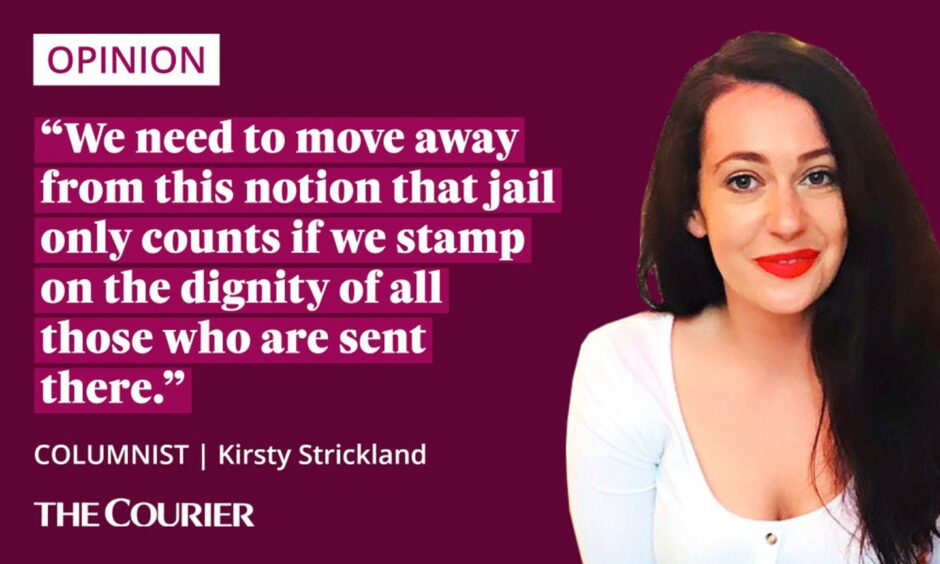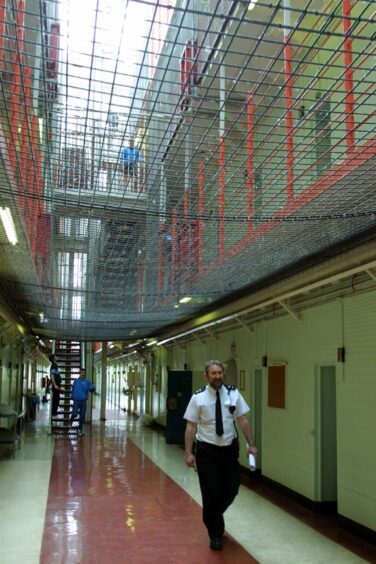I felt oddly vindicated when I read The Courier’s report on the dramatic reduction in illegal mobile phone use in Perth Prison.
During the pandemic a scheme to give some inmates access to an “unhackable’’ mobile phone was introduced because at the time in-person visits were banned.
At the time, I thought it seemed a sensible and humane move.
And so it has proved to be.
When in-person visits were resumed, the scheme continued.
The benefits of allowing prisoners to have access to a monitored mobile phone were deemed to outweigh the potential risks.

And between January and October this year, only seven prisoners were found in possession of an unauthorised device.
The phones don’t have access to the internet. And the Scottish Government says data from HMP Perth shows that the scheme has contributed to “safe and stable prison environments”.
When the initiative was first introduced, the news was met with predictable outrage from certain quarters.
Phones! For criminals!
What’s next? Decent living standards and edible food?
The furiously spittle-flecked response showed the punitive approach some would like to see people in prison subjected to.
Loss of liberty is the punishment issued for certain crimes.
That doesn’t mean those who are locked up should be subjected to ongoing cruelty and neglect.
Prison mobile phones eased Covid hardships
What happened elsewhere in Scottish Prisons during the pandemic will be uncovered during the upcoming public inquiry.
And the findings are likely make for grim reading for those in charge.
Staff shortages led to extended periods of inhumane conditions for inmates, which meant isolation and a fall in living standards.
That was the case for all prisoners. Not just the hardened, violent criminals, who the public might struggle to muster up sympathy for.
It included those who were jail for non-violent offences, such as theft.
It included those whose crimes can be directly traced back to their history of alcohol or drug addiction.
And it included female prisoners in Scotland, almost 80% of whom have a history of serious head injury, mostly through suffering domestic abuse.
Inmates’ loved ones don’t deserve to suffer
Phones for inmates shouldn’t be at all controversial in a sensible country that is driven by evidence, rather than a desire to punish, punish and punish again.
When somebody commits a crime that warrants a prison sentence, it is not only that person who is affected.
Their spouses, children and wider family are also impacted by their period of incarceration.
Prison-issued phones offer flexibility for parents and children.
They give opportunities for connection and bonding that simply aren’t possible when calls have to be planned in advance and scheduled around family routines and lock-up times.
Allowing prisoners to stay in touch with their loved ones isn’t a sign that our prison system is becoming too soft-touch.
Prison should be a place of rehabilitation and respect
Scotland’s record on prisoner numbers and prisoner treatment isn’t one to be proud of.
We have the highest prison population rate in the UK and one of the highest in Europe.
The lead up to Christmas can be difficult if you have a loved one in prison. If you need help & support, there are many organisations you can turn to. See the #emailaprisoner website or you can call the Prisoners Families Helpline on 0808 808 2003 https://t.co/EoWgIkjIim@hmpps pic.twitter.com/ESchwel5MV
— Unilink (@PrisonTechnolog) December 7, 2022
Earlier this year, a report by Glasgow University showed rate of suicide and drug-related deaths in Scottish prisons is much higher than in England.
Deaths in our prisons are at a record high.
Academics at the University said that many of these deaths stemmed from “distress and a loss of hope.”.
“People in prison won’t get food, won’t get healthcare or shelter unless the state does its job,” wrote one of the authors.
“And when you have such a high rate of death in prison – and a higher suicide rate and drug death rate than in English prisons – real questions are raised about the quality of that care.”
If we accept that the purpose of prison is not only to punish, but to rehabilitate, then we need to move away from this notion that jail only counts if we stamp on the dignity of all those who are sent there.













